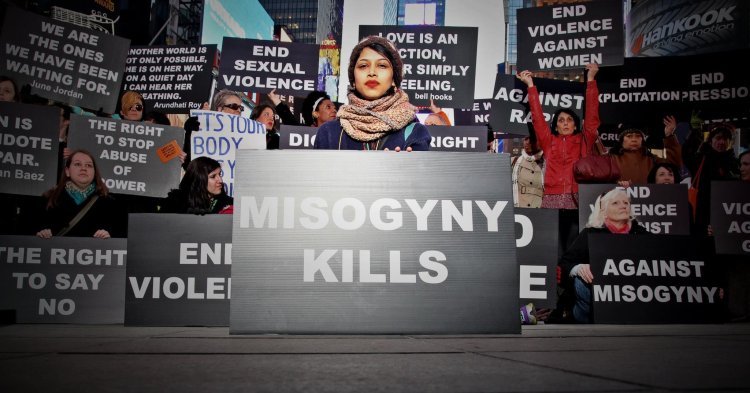DEMOCRACY UNDER PRESSURE.
This article is part of our feature investigating challenges to democracy in Europe. From 22nd March to 4th April, we are digging into the most troublesome threats to citizens’ freedoms and participation in democratic society across our continent – from data privacy to the right to protest, from constrained access to a free press to violence against women.
Both the EU and the UK government enshrine gender equality in their legislation and core values. And yet, neither specifies the killing of women or the word ‘femicide’ in their laws. The tragic murder of Sarah Everard in the UK has propelled the issue of violence against women into the media spotlight once again, but unfortunately femicide has been an ongoing issue for years. The UK government’s latest Police, Crime, Sentencing and Courts bill, in the aftermath of a terrible tragedy, strengthens police power against protestors and emphasises the need to protect memorials. Punishments for crimes against women, however, have not been adjusted.
The voices of women have routinely been silenced, from not having their experiences believed, to the denial of justice from the courts, to the tragic elimination of women’s voices at the hands of male violence. The UK supposedly prides itself on its liberty, historic democracy, and freedom for all, while British foreign secretary Dominic Raab has claimed that global democracy is ‘in retreat’, and that the UK should act as a ‘force for good in the world’. How can governments defend democracy in societies where the voices of women are continuously silenced?
What is femicide?
The European Institute for Gender Equality defines femicide as ‘the killing of women and girls because of their gender’. This can take many forms, but in all of them, it serves as a means of controlling women in the most violent expression of the patriarchy. The term was coined in Latin America, femicidio, as a response to the prevalence and escalation of murders of women and girls. The need for a distinct word is tragic, but it does serve a useful purpose: it acknowledges the fact that when women are killed, it usually happens because they are women, and is inherently a gendered issue. Acknowledging this difference may mean that the gendered roots of the problem are slightly clearer, and therefore that attempts can be made to tackle them.
The silencing of women through violence is an issue in every part of the world, and Europe is no exception. According to the charity Refuge, in England and Wales alone, 2 women a week are killed by their current or former partner. In 2017, 854 women were killed by a partner or ex-partner across the 16 EU member states featured in the European Institute of Gender Equality study, with Romania, Northern Ireland and Finland having the highest rates. There was no comparable data in the remaining member states. As femicides specifically are not recorded by governments, external organisations take the responsibility to record this data: for example, the European Institute for Gender Equality has published studies on violence against women across the EU, while in the UK the Femicide Census has provided the most comprehensive study to date on the killing of women in Britain.
Femicide and the law
The UK and the EU make no distinction between homicide and femicide. Homicide encompasses the killing of both men and women, with the word femicide not appearing in any of their criminal law. Only 6 EU member states (Belgium, Estonia, Greece, Spain, Portugal, and Sloevia) include ‘an aggravating circumstance if the crime was based on hatred of the victim due his/her gender/sex’. If the issue is distinguished by the justice system, governments will have more of an obligation to tackle them. Besides this, it will also be a deserved acknowledgement of the injustice faced by all victims and survivors of misogynistic violence.
The Police, Crime, Sentencing and Courts bill, recently approved by parliament, reflects attitudes of indifference towards violence against women. The bill criminalises trespassing, emphasises the need to protect monuments and statues, and strengthens the powers of police against protests. David Lammy, Labour MP for Tottenham, criticised the bill in his speech in parliament on the 16th of March: “The government thinks that people who damage statues should spend up to 10 years in prison because of their ‘emotional value’, but is fine with 5 year sentences for rape.”
The lack of justice for victims of sexual assault is highly discouraging to survivors, and in the year up to March 2020, only 1.4% of rape cases reported to police ended up with a suspect being charged. This may be for several reasons, one being that often rape survivors are treated with suspicion, despite the fact that in the UK, only 4% of cases of sexual violence are found to be false, and 2-6% in Europe and the USA.
What can be done?
There are attempts to tackle this issue in legislation, however. In the UK, the campaign ‘Make Misogyny a Hate Crime’ has attracted a huge amount of support. The main drive of the campaign is to include misogyny in the list of crimes for which a judge may decide to extend a sentence on grounds of hate crime. On the 17th March 2021, the government instructed all police forces to record misogynistic hate crime. This means that, in theory, misogynistic attacks or actions now have the recognition of the law, as well as possible harsher sentencing. However, doubts have been expressed over the enforceability of this idea if it were to be incorporated into the law. It has also been suggested that any form of attack against a woman would be dubbed as a hate crime, minimising the effect of the change in the first place by reducing the stigma attached to this type of crime.
An attack on democracy
This silencing of women and girls is present in every aspect of society. Female politicians report a huge number of death threats, rape threats, and sexism, particularly online. A tragic example of this is the murder of Jo Cox by a supposed ‘political activist’ in 2016. In another example, Natalie McGarry, the MP for Glasgow East, was advised to increase security at her office in response to murder and rape threats. Labour MP Jess Philips has stated that she has once received more than 600 rape threats in one night. It is not just politicians who receive this abuse, women journalists also bear the brunt of misogyny: in one survey, 73% of female journalists had experienced online abuse, harassment, threats or attacks. These awful incidences of harassment and threat may be detrimental to the representation of women in politics, the media, and other public professions, discouraging women from entering and staying in them. Of course, a lack of sufficient representation can have a devastating impact on the advancement of women’s rights, LGBT+ rights, and human rights in general as women are less available to hold governments and organisations to account.
Women from all walks of life experience some form of sexual harassment, ranging from abuse on a short walk home, to disturbing threats aimed at women in the public eye. They are killed across the continent, and indeed the world, every single day for the simple fact of being women. The UK and the EU consider themselves beacons of upheld democracy and human rights, and have taken some positive steps towards tackling violence against women. One major step has been the creation and signing of the Istanbul Convention, a treaty of the Council of Europe on combating violence against women (Turkey has recently pulled out of it, expressing concern over undermining ’family values’). However, there is still so far to go in terms of sufficient legislation and legal acknowledgement of a problem that is a pandemic in itself. A country can only be free when its citizens are heard, seen, and listened to, which is simply not possible while femicide and gender-based violence run rampant. So many citizens have their voices routinely silenced, whether it be through gender-based violence, racism, classicism, ableism, homophobia, transphobia, or any form of bigotry. While this continues, it will always be much harder for us to claim we live in truly free and democratic nations.


Follow the comments: |
|
